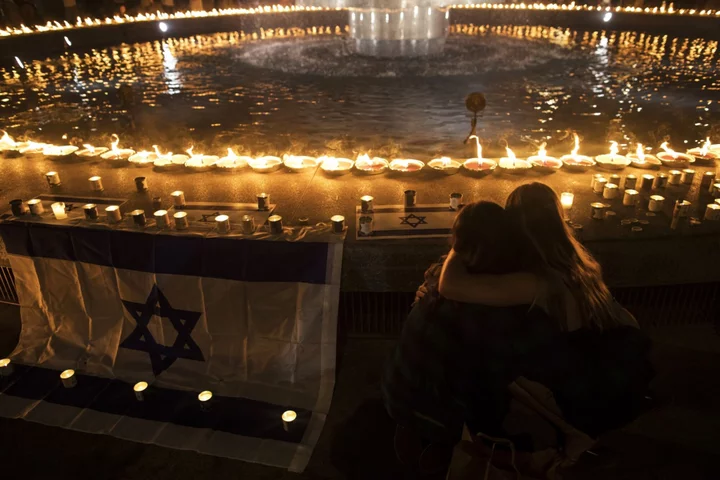Family and friends were ringing Avshalon Haran’s mobile phone for hours on Oct. 7 before a stranger abruptly answered in broken Arabic-accented Hebrew. “Kidnapped, kidnapped, Gaza,’’ the man said. Then the line went dead.
Earlier in the day, Haran, 66, had been huddling in the shelter of his home in Kibbutz Be’eri – along with his wife, two grandchildren, 12-year-old niece, and an elderly relative in poor health – while Palestinian gunmen rampaged through their southern Israeli community.
As they hid, Haran was texting his daughter-in-law, Annalee Milstein. At about 11:30 a.m., she says he stopped replying, and it’s around then that he and his nine family members were likely taken hostage.
Dozens of Israelis, some with dual nationality, were snatched from small towns, army bases and a music festival, and taken back to the Gaza Strip by Hamas militants after the surprise cross-border infiltration. At least 1,300 others, mostly unarmed civilians, were killed. Thousands more were wounded.
Israel is no stranger to violence, or hostage situations, but not on this scale. The raid’s brutality is a defining moment that will shape the nation’s people and politics for generations to come. Images of families being driven off in trucks, rounded up and shot, drew comparisons by Israeli leaders to Nazi atrocities. Israel’s defense minister, the son of Holocaust survivors, said Jews have not seen such carnage in decades.
“The underlying premise of every future policy decision will be based on whether we look strong and forceful,” said Yohanan Plesner, president of the Israel Democracy Institute, “because, if we don’t, we will be slaughtered.”
For more on the Israel-Hamas war, click here.
Israel imposed a complete blockade on Gaza’s 2.3 million residents after the attack, and launched retaliatory strikes that have killed more than 1,500 people. On Friday, it told residents to leave northern areas and move south as it appeared to be preparing for a ground offensive that risks drawing in other enemies including Hezbollah.
Read more: Israel Mourns ‘Another Level of Cruelty’ as Gazans Await Attack
The Israeli military says it has informed 120 families that their loved ones have been abducted, but won’t say how many people have been taken, or released any other details.
According to Abu Obeida, a spokesman for the armed wing of Hamas – which rules Gaza and is designated a terrorist group by the US and European Union – the hostages are hidden in safe places throughout the 140-square-mile enclave, and in tunnels underneath it.
Going back to the late 1970s, Israel’s enemies have taken hostages, sparking major conflagrations, and used them as bargaining chips, human shields or to tried to swap them for Palestinians prisoners. Israel has an ethos of never leaving anyone behind, dead or alive.
The last time kidnappings caused a national outpouring was in 2014, when three teenagers hitchhiking in the West Bank were seized and killed by Hamas gunmen. Before that, the abduction of soldier Gilad Shalit in 2006 triggered a military operation in Gaza. He was released five years later in a controversial exchange for around 1,000 Palestinian security prisoners.
Qatar is leading talks with Hamas to try and secure the return of the hostages, but there are no signs of a breakthrough, as both sides focus on fighting, for now. Families of missing relatives are asking for help to locate them on social media, and those with dual nationalities are appealing to foreign governments.
With more than 5,000 Palestinians currently in Israeli jails, a swap might not be possible this time, according to Dan Orbach, a military historian at Hebrew University in Jerusalem.
“There is such a large number of hostages, we can’t pay their price,’’ he said. “That would mean emptying out our prisoners, a move that will be deadly to deterrence.”
Gershon Baskin, a lifelong peace activist who helped secure Shalit’s release, fears the militants will fulfil a promise to begin to kill the hostages one by one as fighting intensifies — a move that could make reconciliation even more unlikely.
“It’s not about the occupation and not about what needs to happen to free Palestine,” he said. “Hamas has done more damage to the Palestinian cause than has been done in decades.”
Read more: How Israel, Palestinians Went From Peacemaking to War
Haran’s phone was last tracked in Gaza, Milstein said. She is hopeful her loved ones are still alive and is waiting to hear from authorities, who are still identifying bodies in Kibbutz Be’eri. As of Friday morning the death toll in the 1,200-strong community was 110.
Nearby, in Kibbutz Nir Oz, Sagui Dekel-Chen sounded the alarm when he saw gunmen approaching on Oct. 7. Unarmed, the 35-year-old engaged in hand-to-hand combat to protect his community and family, according to his father, Jonathan Dekel-Chen, a Connecticut-born professor of Jewish history at Hebrew University.
Sagui has disappeared along with almost half of the kibbutz’s population, thought to be dead or kidnapped.
“We’re in totally new territory,” his father, said. “This will be a huge trauma for generations to come.”









